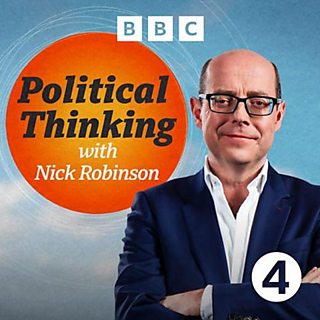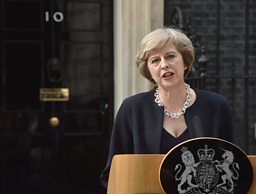Eight Things We Learned About Theresa May
In an absorbing interview with Nick Robinson on Political Thinking, Theresa May gives us a window into public life and what it was like to try and weather the storms that wreaked havoc with her time in office.
They discuss her new book, The Abuse of Power, in which the former Prime Minister charts how her religious upbringing and events including the Hillsborough disaster, Grenfell and Brexit have shaped her awareness of abuse of power.
Here are eight things we learned about Theresa May...

Listen to the full episode here
1. Being the vicar’s daughter was practice for being an MP
Theresa May feels that her idea of public service was shaped by being brought up in a country vicarage, both through her father, as the local vicar, but also by the wider community.
Neither her father nor her mother was alive to see her elected as an MP, but they did get a preview of her future when they engaged in an argument over the Sunday lunch table. “He [her father] sometimes used to say to me, ‘You're not addressing a public meeting. There's no need to shout!’ I think now, well, little did he know I was just getting in some practice!”
Her status as the vicar’s daughter made her quite self-conscious about how she expressed herself in public because she knew that it reflected upon her family. Her cautious nature was, she says, a useful attribute for her roles as Home Secretary and Prime Minister. However, she recognises that being more outspoken might have got her a better press.
2. The Hillsborough tragedy taught her about abuse of power
Though it came eight years before she was elected as a Conservative MP for Maidenhead, the Hillsborough disaster of 1989 would help form Theresa May’s view about abuse of power.
Mrs May admits that, at the time, there was blanket government trust in the police and, equally, a pervasive suspicion towards football supporters because of the violence at some games. She illustrates the gulf in understanding by recalling the encounter that leading Hillsborough campaigner Margaret Aspinall, whose son James died at the match, had with Margaret Thatcher at a service for the dead at Liverpool Cathedral. Aspinall wouldn’t shake Thatcher’s hand because she wanted to know what the police were doing that day. “Their job, my dear,” came the reply.
Mrs May, who decided to continue the independent inquiry into the tragedy and who apologises for Hillsborough in her book, acknowledges that, at various levels, “those in power were using their power to stop them from getting to the truth.”

3. She thinks Grenfell highlighted stereotypes about people living in social housing
While Hillsborough didn’t happen during Mrs May’s time in office, the fire at Grenfell Tower in 2017 that killed 72 people, did. She was criticised at the time for not meeting the survivors on her first visit, a mistake she now acknowledges. As with Hillsborough, Mrs May feels that this was about another group of people being ignored after raising concerns, and she acknowledges that some people saw social housing residents as “second class citizens.”
4. Sir Lenny Henry helped her understand the impact of the Windrush scandal
In 2018, it emerged many British citizens who arrived as migrants from the Caribbean between the late 1940s and 1970s were facing deportation and detention – despite having the right to live in the UK. Theresa May makes the point that immigration laws were tightening over various administrations. Just how tight was made clear to her in remarks that Sir Lenny Henry made at a service marking the anniversary of the death of Stephen Lawrence.
“He brought home to me that the Home Office was requiring everybody to have four pieces of documentation for every year they lived in the UK. Four. I just thought, ‘Oh’.”
5. She doesn’t consider herself a victim of Brexit…
She does however feel that both Remainers and Leavers made her life difficult. In the case of the former, she accuses the Speaker at the time, John Bercow, of effectively trying to overthrow democracy. “I think the various things that the Speaker did actually helped the other side of the argument. It didn't work towards trying to deliver Brexit. He wasn't working towards trying to deliver Brexit.”
Mr Bercow has previously hit back against Mrs May's criticisms, telling Times Radio that the former Prime Minister was looking for "someone to blame other than herself for her own palpable failure".
6. She wasn’t President Trump’s cup of tea
Pictures of Theresa May holding hands with Donald Trump on her first official visit to The White House suggested the special relationship was in good health. However, holding hands happened because Mr Trump had warned her of a slope down to where the waiting press were. “I don't know whether that was being gentlemanly because he was worried about me or whether he wanted me to help him,” Mrs May says.
Later, she'd be under no illusion about what Mr Trump thought of her. “I think he heard that somebody had paid for me to go and speak somewhere, and he said he'd pay for me not to speak in front of him!”
7. She says we should worry about democracy
Mrs May describes the Capitol riots that dramatically marked the end of the Trump administration as one of the signs of “increasing polarisation in politics.”
“We live in an absolutist world where ‘You are either 100% with me or 100% against me,’” she says. Noting polling in the US and the UK showing a decline in the number of young people who think that democracy is the right way to form a government, she adds: “We should worry about that.鈥疻e have to work hard now to uphold democracy in the sense of ensuring that the new generations understand the importance of democracy.”
8. She thinks showing emotion is still seen as a sign of weakness in women
Theresa May was famously in tears as she resigned her premiership in 2019. For some of her advisors, this was a belated show of vulnerability. However, she knew that the press wouldn’t see it like that.
“One of the challenges still, sadly, for women in public life is that if a man shows emotion, it’s ‘oh, it's wonderful he's showing that side of himself.’ If a woman shows emotion, it's weakness,” says Mrs May, adding: “if a man shows strength, that's brilliant. If a woman shows strength, she's an aggressive harridan. Getting that balance is still difficult for women in public life.”
More from 成人论坛 Radio 4
-
![]()
When It Hits the Fan
Inside the world of crisis managers and spin doctors as David Yelland and Simon Lewis watch the week's biggest PR disasters unfold.
-
![]()
Life Changing
Dr Sian Williams talks to people who have lived through extraordinary events that have reshaped their lives in the most unpredictable ways
-
![]()
Amol Rajan Interviews...
Amol Rajan interviews the era-defining pioneers, leaders and maverick thinkers who are shaping our rapidly changing 21st-century world
-
![]()
The Briefing Room
David Aaronovitch and a panel of experts and insiders present in-depth explainers on big issues in the news




